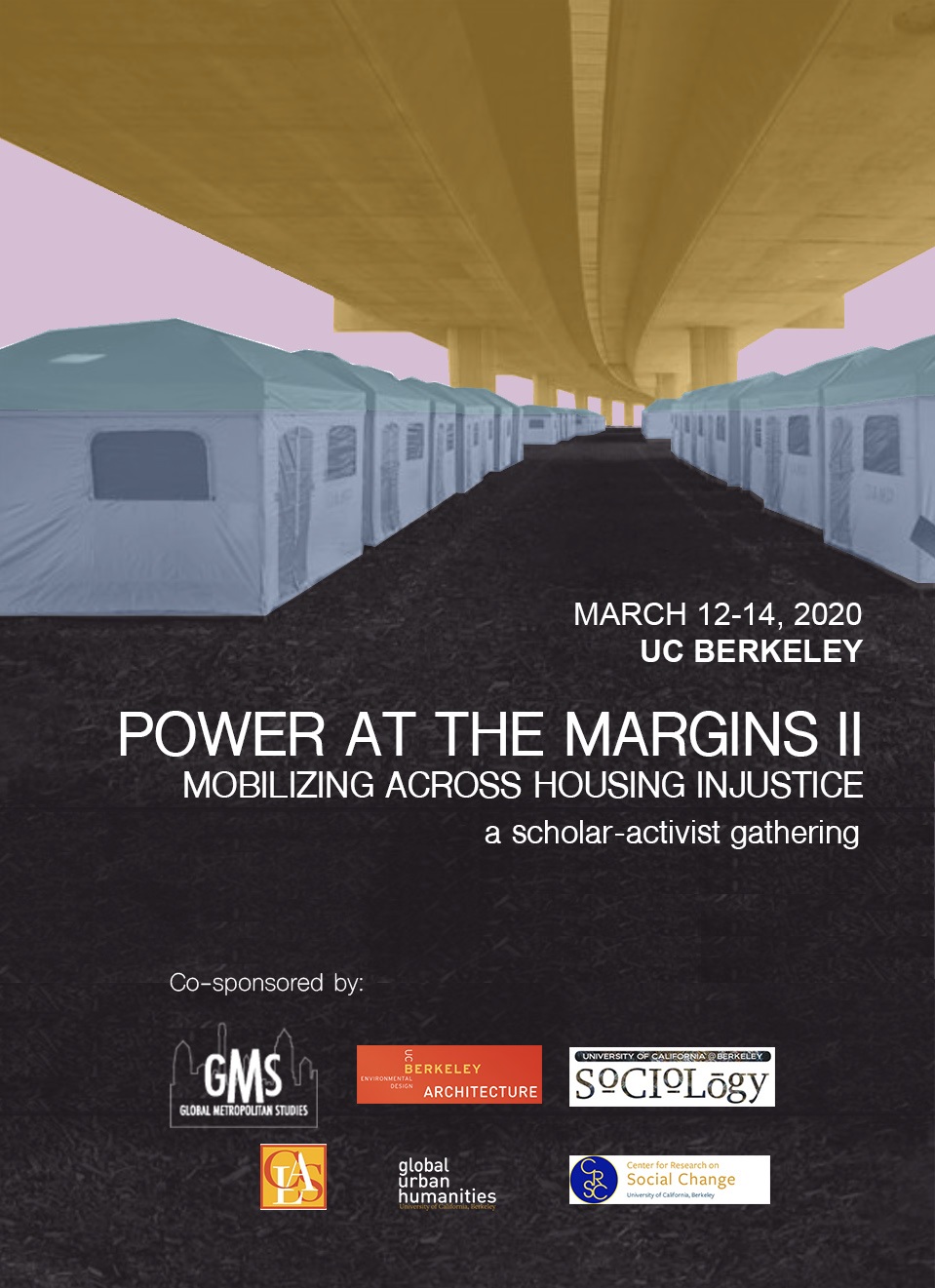 Apply now to be a presenter at the scholar-activist conference at UC Berkeley March 12-14, 2020.
Apply now to be a presenter at the scholar-activist conference at UC Berkeley March 12-14, 2020.
Academics across the social sciences and humanities have long worked to theorize the people, spaces, and politics of the fringes of traditional housing. Homelessness, eviction, squatters’ rights, and the right to land all find their way into fruitful interdisciplinary scholarship, much of which links these struggles to broader questions of citizenship, governance, and exclusion.
Meanwhile many of the same root problems motivate housing activists around the globe. These community organizing struggles create grounded, pragmatic critiques and strategies, as activists deploy popular education to empower those immediately affected and often situate their work within broader social justice movements, including labor, criminal justice, environmental, immigration, ethnic, racial, and caste struggles.
Power at the Margins II grows out of the Constructing Solidarities through Power at the Margins initiative, and follows an initial symposium at the University of Illinois (September 2017) and conference at the University of Minnesota (March 2018).
Our intention is to continue creating a space in which the unique work done by organizers and academics can collide, fostered by proximity that is rare across both divides both geographic and work-related in nature. All panels will include both organizers and scholars.
HOW TO APPLY
To apply, please send a brief (300-500 words) summary of what you would like to present at the conference.
Panels will be a mix of organizers and academics and will be organized thematically. Academics are invited to present academic research, while organizers are invited to present on recent campaigns, organizing strategies, research, or other issues of relevance. Academic applicants are encouraged to circulate an article or essay prior to the meeting. A select group of these writings will be invited for publication in a special issue of the Radical Housing Journal.
Below are some themes which may provide fertile ground for reflection, but are not in any way intended to set boundaries on submissions or ideas:
- Community organizing, social movements, and struggles around housing and homelessness
- Dispossession, eviction,and forced migration
- Intersections between housing (in)justices, policing practices, and mass incarceration
- Intersections between raced, gendered, and hetero-normative constructions of “home”
- How different struggles over land claims and governance can enable or shape alternative modes of housing, particularly among people living in poverty
- The role of social work, radical care, and harm reduction in housing
- Architecture and planning approaches to housing equity and affordability
- The law and housing and homelessness
- The politics of housing and homelessness
- Successes and struggles of community-based research on housing and homelessness
Please email poweratthemargins2020@gmail.com by October 1, 2019, with your abstract or presentation proposal. In your email, please indicate your position (i.e. academic faculty, graduate student, activist) and any additional roles you’re interested in performing at the conference, such as chairing a session, being a discussant on a panel, or organizing a side activity.
CONFERENCE SCHEDULE
Thursday evening will begin with a plenary panel. Friday will be a day of concurrent panels, workshops, and presentations, concluding in a plenary panel, and evening gathering. Saturday morning will be comprised of concurrent panels and one plenary panel. No registration fees, and some meals will be provided.
ACTIVISTS AND GRADUATE STUDENTS: We will be able to provide accommodation through solidarity housing and shared rentals as well as a travel stipend to cover flights or gas to a limited number of accepted proposals from activists and graduate students with limited means. If you are applying as an active member of a grassroots movement we will only be able to provide support for one member in order to include the widest range of participants.
We ask all graduate students and faculty members to also apply for funding within their own institution. If you are interested in applying for a stipend, please attach a document to your conference application which states:
- Name
- Institutional or organizational affiliation
- Do you need a place to stay? Do you need travel coverage? Do you need both?
- If you need travel support, where will you be traveling from?
- A paragraph on how attending the conference will benefit your work
For any questions about the conference please email Chris Herring (christoph.herring@berkeley.edu)